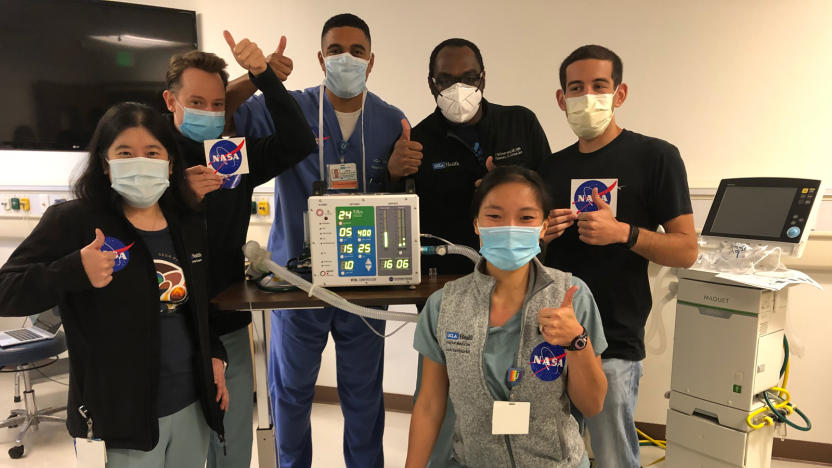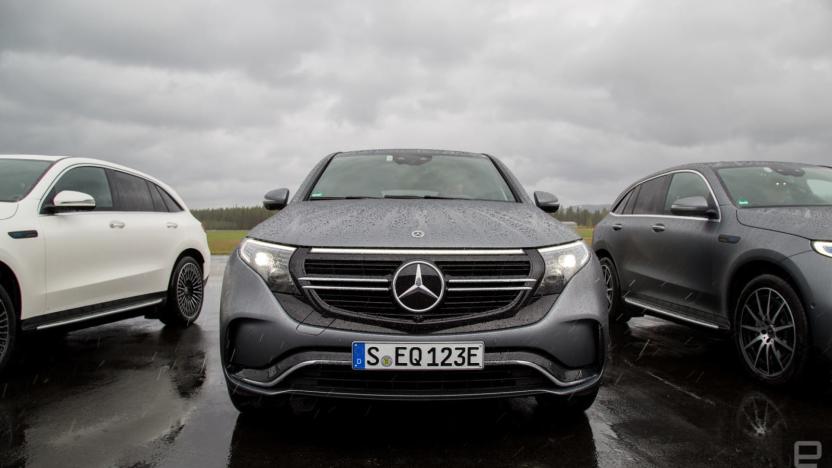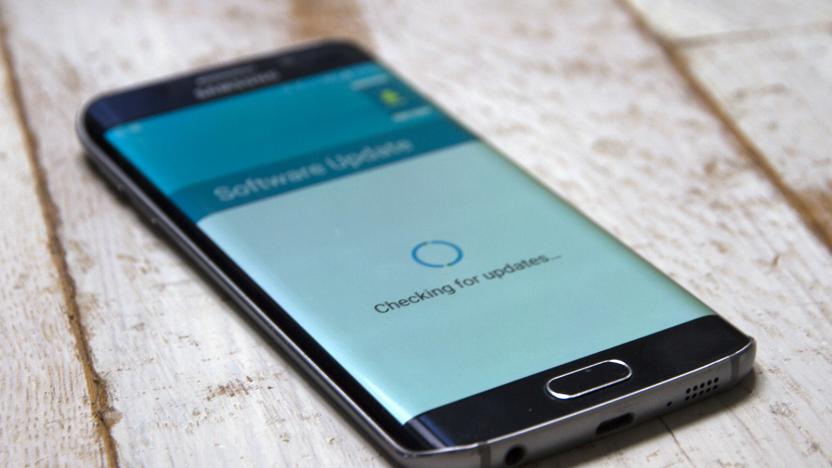manufacturers
Latest

Eight US companies will manufacture NASA’s COVID-19 ventilator
Eight US companies will manufacture the ventilator designed by NASA's Jet Propulsion Laboratory and fast-tracked by the FDA.

Ventilator companies are opening up critical repair documents to the public
After being called out by the US Public Interest Research Group (PIRG), more ventilator manufacturers are sharing critical repair information.

Alexa Auto adds offline capabilities that work in tunnels and parking garages
Having an Alexa-enabled car is convenient if you want to make a call, check the weather or order groceries while you drive. But that convenience quickly disintegrates when you drive through tunnels, parking garages or remote areas and lose signal. Amazon wants to fix that. Today, it released version 2.0 of its Alexa Auto SDK, which now comes with a bunch of offline functions.

Mercedes-Benz likely to agree to California's tougher emissions rules
Mercedes-Benz may be the next company to agree to California's voluntary emissions rules, The New York Times reports. Ford, BMW, Volkswagen and Honda have already pledged to meet California's standards and make their engines more efficient every year until 2026. The pact goes against the Trump administration's attempts to roll back Obama-era emissions reduction goals.

US government warns China may have access to drone data
Today, the Department of Homeland Security issued an alert warning that Chinese-made drones may be sending flight information back to their manufacturers, who could share it with third parties. According to CNN, the alert warns companies and organizations that the US government has "strong concerns about any technology product that takes American data into the territory of an authoritarian state that permits its intelligence services to have unfettered access to that data."

Google plans faster updates for all Android phones in 2017
If you didn't get a timely update on your Moto, Samsung or HTC device, but your friend over there with the Google Pixel did, it's not necessarily the manufacturer's fault. The complexity of Android, especially when it comes to security, is also a big part of the problem. In fact, Google revealed that around half of the 1.4 billion Android devices out there didn't get important security patches in 2016. This year, however, it plans to work more closely with smartphone makers to improve that stat.

Apple schedules November "MFi" conference in Shenzhen, China
Licensed third-party accessory manufacturers will meet in Shenzhen, China, November 7-9 at an Apple-sponsored "Made for iPhone/iPod/iPad" (MFi) conference. It's expected that hundreds of manufacturers will attend to learn about Apple's licensing program and hear details of new product directions. As Apple followers might expect, the new Lightning connector is on the agenda for the conference, with a "Designing Lightning Accessories" session the first day. Apple's new connector is expected to make it to all iOS and iPod devices within the next six months or so, and other sessions on "Transitioning from Analog to Digital" and "MFi Program Changes" might also provide licensees with details on the somewhat expensive internals of the new connector. Also on tap are sessions focusing on the new Bluetooth 4.0 standard, which provides for both a new low-power mode for battery savings on devices like Bluetooth pedometers as well as a dual radios for accessories that need to support older Bluetooth devices. Not to be forgotten in the rush to new standards, Apple's AirPlay and AirPrint are also receiving attention. 9to5Mac has a copy of the conference agenda available for your perusal. [via iPodnn]

Company sues Apple, others over claim of patent on 3G
This is one of the weirder claims in the already strange area of patent claims going on around cellphone technology lately. A company based in New Jersey named Golden Bridge Technologies has come forward saying that it owns patents on some technologies that were eventually used to create the 3G phone protocol standard, and that it's holding device manufacturers such as Apple, Barnes & Noble, and others accountable for the patents. A complaint filed in California earlier this week says that Golden Bridge's patent covers 3G tech, and that anyone using that tech owes them money. You can find a full copy of the complaint online. This is just the beginning of the legal battle. Presumably Apple and the other companies in the complaint will try to either contest the patent itself or the claim that they used it illicitly.

Apple reportedly cuts orders for iPad parts
Apple supposedly cut its fourth quarter orders for iPad components by 25%, according to a report from Bloomberg. This adjustment may have a financial effect on suppliers and manufacturers like Foxconn, but may not hurt Apple. Some analysts, like Mark Moskowitz of JPMorgan, are not adjusting their outlook and still expect Apple to sell 10 to 12 million iPad units in the last two quarters of 2011. Before customers begin to panic about reduced inventory and product shortages, some analysts believe this reduction was part of Apple's strategy to compete with other tablet manufacturers. In this scenario, Apple ordered high and locked up suppliers and manufacturers so their competitors would be at a disadvantage. Now that this quarter is approaching, the Cupertino company is adjusting its orders down to a lower level. Other analysts believe Apple is responding to weakening demand for the iPad and global economic conditions. Analyst Wanli Wang of RBS Asia Ltd., says, "It's back to reality. Now it seems even for Apple, due to the market situation, we need to be conservative." It's also possible Apple is cutting production in advance of the iPad 3 launch early next year. It may also be shifting some of its manufacturing to Brazil.

ComScore calls Android top dog, Apple pulls further ahead of RIM
According to ComScore, out of the 82.2 million people in the US with a smartphone (up ten percent from last quarter), Android came in first as the biggest platform yet again, capturing a whopping 41.8 percent of the market like a boss. In a not-so-close second, Apple was able to snag 27 percent, followed by RIM in the third place spot with 21.7 percent -- down 4 percentage points from last quarter. Pulling up the rear is Microsoft with 5.7 percent, and lastly Symbian with a grim 1.9 percent -- both down when compared to the previous three months. As far as US hardware manufacturers goes, Samsung is still on top with 25.5 percent of the market, while LG got 20.9 percent and finally Motorola with 14.1 percent, down 1.5 percentage points from before. Apple was able to snag some standing in the OEM space with a 9.5 percent share, while BlackBerry-maker RIM only captured 7.6 percent. As the battle wages on, looks like Androids, iPhones, and BlackBerrys (oh my) are still on top -- at least for this quarter. Check out the PR after the break for the full scorecard.

Wall Street Journal suggests higher-resolution iPad next year
Apple is prepping its Asian suppliers to begin production of the next generation iPad in October, according to the Wall Street Journal. The Cupertino company has placed orders for about 1.5 million iPad 3 tablets. Apple is targeting a launch in early 2012 which fits in perfectly with the company's current yearly upgrade schedule. Apple is reportedly ordering 9.7-inch displays with a resolution of 2048 x 1536, increasing the 1024 x 768 resolution of the current iPad and iPad 2 display. Foxconn is the assembler of the iPad and has not commented on its future plans. Apple's Beijing spokeswoman Carolyn Wu also declined to comment.

'iPhone 5' cases show not much will change from iPhone 4
Hardmac has released a photo from a case manufacturer who claims the case is for the forthcoming iPhone 5. In contrast to an earlier report that the iPhone 5 would see a significant external redesign, the case design shows a design nearly identical to the current iPhone 4. Hardmac claims its source is reliable, and while case manufacturers' leaks weren't necessarily an accurate barometer of possible product design in the distant past, the leaked cases for the iPad 2 were quite accurate depictions of its final form. Taken together with supposedly leaked engineering diagrams and a video from a few months back claiming to show the iPhone 5's antenna (which was virtually identical to the Verizon iPhone's redesigned antenna, except for the inclusion of a SIM slot... hmmm), these rumors are painting a picture of an iPhone 5 that's externally similar in most respects to the current iPhone 4. In all honesty, I think this is what virtually everyone is expecting from the iPhone 5; the external design barely changed at all between the iPhone 3G and 3GS, and despite widespread FUD about the iPhone 4's antenna (later moderated via objective analysis), it's unlikely that Apple will switch up the design significantly for the next generation iPhone. If Apple follows its yearly pattern, the iPhone 5 will debut in either June or July of this year. [via Mac Rumors]

Visualized: US smartphone market share, by manufacturer and platform, made pretty
They say a picture is worth a thousand words -- but in this case, a picture is worth tens of billions of dollars in market share. Nielsen has broken down its US smartphone market share stats between November and January in two dimensions -- by market share and by platform -- and stuffed all that data into a single block of mesmerizing color. It's interesting to see the Apple and RIM juggernauts flanked by two imposing, red slivers of HTC, isn't it? The research firm also took a look at platforms by age group; the shares are surprisingly consistent across the board, though Android does have a slight edge with the young'uns. Follow the break for that chart.

Apple devices seen everywhere at the LA Auto Show
Tech blog Cosby Sweaters noticed something interesting at the recent LA Auto Show: Apple was there in force. Not officially -- there is no iCar being sold just yet. But iPads and iMacs were used for a surprising amount of the kiosk displays by manufacturers. Lexus even had a 15-iPod touch display (as seen above) set up to demonstrate features and functions of its new cars. When it comes to functionality, security, and usability, Apple's devices are actually relatively cheap to set up, create as a kiosk and then use at a show. This is probably far from the last time we'll see iPod touches and iPads used in this way at conventions.

Apple tops consumer satisfaction survey again
For the seventh straight year in a row, Apple has topped the American Customer Satisfaction Index survey, ringing in at number one on the annual list of PC manufacturers as ranked by customers. And it earned its best score ever -- an 86 out of 100. That's nine points ahead of its closest competitors, which are Dell, Acer, and HP. As you can see from the chart above, Apple is on its way up as well. It's tempting to lay success like this at the feet of the iPod, iPhone, and iPad, but keep in mind that this is strictly about PC manufacturers. Consumers are more satisfied than ever with their Macs, and it shows on the sales side as well, with Macs selling in record numbers. Apple now calls itself a mobile device company, but it turns out that branching out to mobile devices from personal computers was one of the best things that ever happened to the Mac. Who's at the bottom? Compaq is the only PC brand that didn't improve from last year, and it was the lowest of every brand on the index for the ninth straight year. If Apple's winning, somebody's got to be the loser, right?

Rumor: Apple working on parts for iPad 2
Here's a fun rumor to give you something to dream about this weekend. Digitimes is reporting that Apple is on the hunt for parts for the iPad 2. The company is reportedly in the validation stage with a few suppliers for touch-based displays and reinforced glass, prepping production on a second generation iPad for a launch in early 2011. That's all we've got -- there's no details on what new features the iPad might have (although a camera would be an excellent guess) or any other way it might differ from the current model, but it looks like most of the speculation has been on target so far. There's still quite a while to wait (and honestly, I'd still recommend buying an iPad if you want one right now -- next year is still a ways away, and 4.2 will make even the "old" units seem new again), but there's almost no doubt another iPad is going to happen next year. [via TMO]

Microsoft helping OEMs develop unique Windows Phone 7 apps
Here's the simple truth about touchscreen smartphones: it's the software, dummy. Just look around at all the flagship handsets... other than a choice of with or without a QWERTY, today's handsets all look pretty much the same and are built using the same off-the-shelf components with very few exceptions. That's why we see so much skinning on Android handsets -- that's how manufacturers like Motorola (Motoblur), Samsung (TouchWiz), and HTC (Sense) differentiate themselves with consumers. But how's that going to work for Windows Phone 7 devices with Microsoft boxing OEMs in with a narrow set of hardware and software guidelines that restrict them from modifying the user interface? Easy, Microsoft is going to help them write unique apps. At least that's what this June 1st Microsoft job posting for a senior Windows Phone software developer says: "We are looking for a strong and experienced developer to help the OEM to design and develop applications that make their devices stand out in the marketplace. You will also help them to bring new phones to market." The position would be "working directly with a top Korean cellular phone manufacturer, who has made a large commitment to Windows Phone." Uh, would that be LG or Samsung, we're guessing the former. It'll be interesting to see if these apps are enough to differentiate one touchscreen handset from another. Even more exciting will be watching the homebrew community attempt to hack the manufacturer-specific apps into different handsets in order to create the ultimate Windows Phone 7 superphone... or Frakenphone as the case may be. Regardless, it's clear that Microsoft isn't leaving anything to chance as manufacturers prepare to launch their first devices running Redmond's virgin OS. [Thanks, Abed]

Apple moves past Motorola, up to 3% global cell phone market share
Android may be moving ahead of Apple in the smartphone OS market, but Apple is steadily moving up the handset chart. It's just overtaken Motorola, shipping 8.75 million handsets in the first three months of this year, according to iSuppli. That many phones sets Apple up for three percent of the entire global market; that's a pretty amazing achievement for just the few years it's been in the business. Motorola sold 8.5 million handsets in the same time period, dropping it to number eight on the list while Apple moved up to number six. Who's still above Apple? RIM is the next target with their BlackBerry devices selling 10.4 million units. Sony, LG, Samsung, and then Nokia fill out the top five. The year-over-year growth tells the real story, though: while most of the top five, with the exception of Sony Ericsson, are showing positive growth from last year, Apple leads the pack with a whopping 130.7% growth. When you compare that to Motorola's -42.2% drop-off, it's clear why the two smartphone manufacturers are heading in different directions. Farther down on the list, you can see why China is such an important market for Apple in the next few years; China's TCL Alcatel is also making its way up in the rankings, and it's claiming 160.7% year-over-year growth. If Apple is going to continue the kind of growth it's had over the last year, growing foreign markets like that will be more and more important.

RIM comes onboard with the Wireless Power Consortium
Look's like the Wireless Power Consortium can add another one of the big boys onto its list of powerful allies. Research in Motion's come on board as a member of the organization, which now includes 21 manufacturers. The Wireless Power Consortium's noble quest, you'll remember, is to develop a wireless charging standard, which it calls the Qi. The group also announced simultaneously that it's successfully finished the second round of prototype testing. RIM's support is adds further hope to the pursuit of said standard, after Nokia joined the cause in October.

Laptop reliability survey: ASUS and Toshiba win, HP fails
Boy, do we have a nice slab of data for you to sink your teeth into today. The 3-year service history of more than 30,000 laptops has been pored over, analyzed, and reduced to gorgeous comparative charts, which you know you're dying to know more about. We should note, however, that the service was provided by SquareTrade, whose primary business is selling extended warranties, but that shouldn't completely prejudice us against reaching conclusions on the basis of the presented facts. Firstly, netbooks have shown themselves to be on average 20 percent less reliable than entry-level laptops, which in turn are 10 percent more likely to break down than premium machines. In other words, you get what you pay for -- shocking, right? The big talking point, though, will inevitably be the manufacturer comparison chart above: here ASUS and Toshiba (rather appropriately) share the winners' spoils, while HP languishes in the ignominious last place, with more than a quarter of all laptops expected to suffer a hardware fault of some kind within three years. So, does your experience corroborate / refute this info? Keep it gentlemanly, okay?





